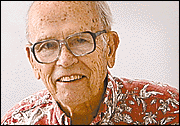Advertisement - Click to support our sponsors.


Hawaii’s World
WHEN U.S. Supreme Court Associate Justice Antonin Scalia was a visiting professor at the University of Hawaii School of Law early this month, he seems to have wowed every audience he talked to. Scalia wowed his
Hawaii audiencesThat included students, faculty, members of the bar association and Rotary Club of Ho-nolulu, where I heard him talk.
To the Rotary he stressed his reverence for the Constitution, the great men like Washington and Franklin who spent from May to September in Philadelphia in 1787 to hammer it together ("a whole baseball season") and the way it has endured for 213 years, during which France has had five constitutions.
He recalled the House Un-American Activities Committee, then asked if anyone had ever heard of an Un-French Activities Committee or an Un-Italian Activities Committee. No. Those people are all either French or Italian, he said, and they can't be un-French or un-Italian. But we are a melange of peoples with the Constitution as our unifying document.
He is inordinately proud to be serving on the court that interprets the Constitution when differences arise.
He defined his court position succinctly when a questioner at Rotary said, "I'm over here on the right." Scalia cracked back: "I didn't know anyone was to the right of me." He is a strict constructionist who has said repeatedly he sees no language there mandating either the right to an abortion or the right to die.
I was struck by one strong comparison between Scalia and evangelist Billy Graham.
Time magazine some years ago asked Graham how he dealt with challenges to the miracles in the Bible by people who find them improbable. Graham said he sometimes worried about that early in his career but then retreated to the Bible.
He now holds without perturbation that things are so if the Bible says they are so. From this simple faith Graham sway-ed audiences around the world.
Scalia made reference to the common law of Great Britain. The English have no constitution. They rely instead on accepted historical precedents built up over centuries.
Sitting almost under Scalia's nose at the Rotary lunch was William S. Richardson, the former chief justice of Hawaii, for whom the University of Hawaii School of Law is named.
Richardson, somewhat like former U.S. Chief Justice Earl Warren, whose court rendered the historic school desegregation decision, was able to find precedents not in the Hawaii Constitution to justify rulings deemed socially desirable -- some of them from the Hawaiian monarchy.
Richardson courts declared much more beach frontage open to the public than ever before, held the state owns the basic rights to water falling on our mountains, and declared the state to be the owner of new lands created from active lava flows. Some private property owners were aghast, but the U.S. Supreme Court refused to review the decisions.
SCALIA said the court most often steps in when lower federal courts render conflicting decisions and a national policy clarification is needed.
Since Scalia spoke here, the Supreme Court has decided the case of Rice vs. Cayetano. It agreed by 7-2, with Scalia among the seven, that a Hawaiians-only voter roll to choose trustees of the Office of Hawaiian Affairs violates the 15th Amendment forbidding race qualifications to vote -- but it allowed OHA to stand.
Scalia when here would say only that the case would be decided on the basis of the Constitution and the arguments already made before the court without any disturbance to his enjoyable Hawaii sojourn.
A.A. Smyser is the contributing editor
and former editor of the the Star-Bulletin
His column runs Tuesday and Thursday.